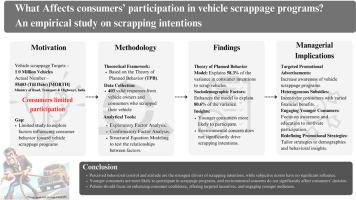当前位置:
X-MOL 学术
›
J. Clean. Prod.
›
论文详情
Our official English website, www.x-mol.net, welcomes your
feedback! (Note: you will need to create a separate account there.)
What affects consumer’s participation in vehicle scrappage programmes? An empirical study on scrapping intentions
Journal of Cleaner Production ( IF 9.7 ) Pub Date : 2024-11-18 , DOI: 10.1016/j.jclepro.2024.144254 , Sarada Prasad Sarmah, Nikesh Nayak
Journal of Cleaner Production ( IF 9.7 ) Pub Date : 2024-11-18 , DOI: 10.1016/j.jclepro.2024.144254 , Sarada Prasad Sarmah, Nikesh Nayak

|
This study examines consumer intentions toward scrapping End-of-Life vehicles (ELVs) to understand how vehicle scrappage policies might alleviate environmental deterioration caused by emissions from outdated vehicles. The research objective is to assess the factors influencing consumer decisions regarding vehicle scrappage, using a model grounded in the Theory of Planned Behavior (TPB). Data was collected from 403 valid responses and analyzed using exploratory factor analysis, confirmatory factor analysis, and structural equation modeling.The findings reveal that the original TPB model accounts for 58.3% of the variance in consumer intentions to scrap vehicles. However, incorporating sociodemographic variables into the model increases the explained variance to 80.6%, with perceived behavioral control as the most influential factor, followed by consumer attitudes. We found that subjective norms do not influence consumers' intentions to participate in scrappage programs. Younger consumers were more likely to support vehicle scrappage, while environmental concerns alone did not foster a positive attitude toward scrappage.In conclusion, while consumer intentions to scrap vehicles are primarily influenced by control and attitude, targeted interventions are needed to enhance policy adoption. Key managerial implications include: promoting acceptance through tailored advertisements, offering differentiated subsidies, engaging younger audiences through awareness campaigns, and redefining promotional strategies to encourage ELV scrappage effectively.
中文翻译:

哪些因素会影响消费者参与汽车报废计划?关于报废意图的实证研究
本研究调查了消费者对报废车辆 (ELV) 的报废意图,以了解车辆报废政策如何缓解过时车辆排放造成的环境恶化。研究目标是使用基于计划行为理论 (TPB) 的模型评估影响消费者对车辆报废决策的因素。从 403 个有效响应中收集数据,并使用探索性因子分析、验证性因子分析和结构方程建模进行分析。研究结果显示,原始 TPB 模型占消费者报废车辆意愿差异的 58.3%。然而,将社会人口学变量纳入模型后,解释的方差增加到 80.6%,其中感知行为控制是最有影响力的因素,其次是消费者态度。我们发现,主观规范不会影响消费者参与报废计划的意愿。年轻消费者更有可能支持汽车报废,而仅靠环境问题并不能培养对报废的积极态度。总之,虽然消费者报废车辆的意图主要受控制和态度的影响,但需要有针对性的干预措施来提高政策采用率。主要管理影响包括:通过定制广告提高接受度,提供差异化补贴,通过宣传活动吸引年轻受众,以及重新定义促销策略以有效鼓励报废 ELV。
更新日期:2024-11-18
中文翻译:

哪些因素会影响消费者参与汽车报废计划?关于报废意图的实证研究
本研究调查了消费者对报废车辆 (ELV) 的报废意图,以了解车辆报废政策如何缓解过时车辆排放造成的环境恶化。研究目标是使用基于计划行为理论 (TPB) 的模型评估影响消费者对车辆报废决策的因素。从 403 个有效响应中收集数据,并使用探索性因子分析、验证性因子分析和结构方程建模进行分析。研究结果显示,原始 TPB 模型占消费者报废车辆意愿差异的 58.3%。然而,将社会人口学变量纳入模型后,解释的方差增加到 80.6%,其中感知行为控制是最有影响力的因素,其次是消费者态度。我们发现,主观规范不会影响消费者参与报废计划的意愿。年轻消费者更有可能支持汽车报废,而仅靠环境问题并不能培养对报废的积极态度。总之,虽然消费者报废车辆的意图主要受控制和态度的影响,但需要有针对性的干预措施来提高政策采用率。主要管理影响包括:通过定制广告提高接受度,提供差异化补贴,通过宣传活动吸引年轻受众,以及重新定义促销策略以有效鼓励报废 ELV。


















































 京公网安备 11010802027423号
京公网安备 11010802027423号